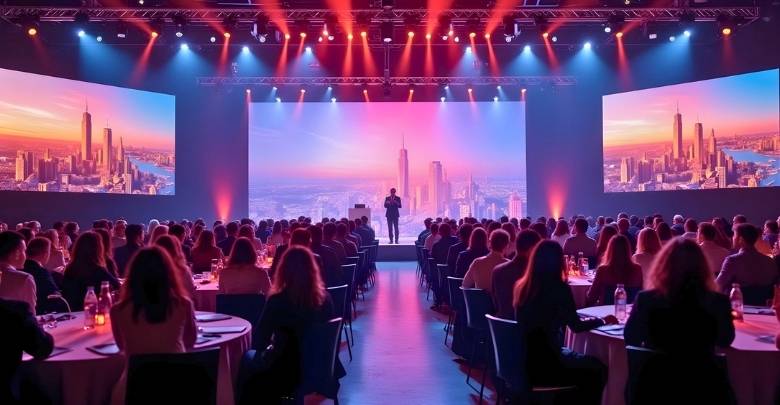Humanities conferences serve as essential hubs for scholars, thinkers, and creatives to explore and discuss the vast landscape of human knowledge. In these gatherings, diverse minds come together to discuss society, culture, and human experiences, which leads to the question: What topics are covered at a humanities conference?
A wide range of topics are covered at humanities conferences, including history, language, ethics, the arts, and cultural analysis. Participants explore how these areas shape identities, influence societies, and reflect human experiences, providing valuable insights into the complex interplay between culture and history in understanding the human experience.
Do you want to know more about the intriguing conversations and ideas that are presented at conferences in the humanities? This article provides all the essential information, diving into each topic covered, its significance, and why these conferences hold such an important place in academia and beyond.
Humanities Conference: Why Should You Attend One?
An opportunity to learn and meet like-minded individuals is provided by attending a humanities conference. You get to discuss new ideas in literature, history, and more. These events bring together experts and thinkers who share insights, making each session an inspiring experience for attendees.
Besides learning, a humanities conference lets you network and find new opportunities. You might meet scholars who share your interests or even get leads on future projects. These events offer a platform for sharing your work and receiving feedback from experienced professionals.
If you’re planning to attend international humanities conferences in Canada, you’ll gain a global perspective from scholars and students alike. Such gatherings can expand your viewpoint and introduce emerging trends. These conferences enrich understanding by linking you with diverse minds from across the globe.
What Topics Are Covered at a Humanities Conference?
At a humanities conference, participants dive into broad areas that explore culture, history, and human expression in diverse ways. Scholars share fresh perspectives that lead to engaging conversations. Here’s an insightful look into what these conferences discuss:
Cultural Analysis and Representation
Exploring cultural analysis focuses on understanding symbols, stories, and social values within different societies. This topic delves into how artists, writers, and creators shape and portray cultural beliefs through varied expressions. Recognizing these representations enables scholars to interpret cultural diversity better and see the shared humanity in art and literature. This analysis reveals deeper meanings that influence societies’ beliefs and attitudes toward the world.
History and Memory
The topic of history and memory explores how past events shape identities, societies, and personal experiences. Scholars discuss how history impacts the present, understanding its influence on future generations. They examine public memory and how cultures remember and sometimes forget significant events. This subject sparks conversations about interpreting historical records and preserving narratives that shape a society’s collective experience.
Language and Communication
Exploring language and communication dives into the ways humans express thoughts, emotions, and identity through words and symbols. This area examines cultural diversity and explores how language influences understanding and interaction among communities. It also discusses emerging forms of digital communication as well as trends in language use and social cohesion. Language reflects the essence of human connection across various mediums.
Arts, Literature, and Interpretation
The creative works that express human emotions, desires, and struggles are analyzed in the fields of arts, literature, and interpretation. This area digs into how literature and the arts reflect and challenge society’s beliefs, creating a space for artistic freedom and critical thought. Through storytelling, music, and visual art, creators offer insights into human experiences, sparking emotional responses that resonate deeply with audiences.
Religion, Beliefs, and Spirituality
A sense of meaning, comfort, and self-identity can be found through religion, beliefs, and spirituality. Researchers look at religious practices, stories, and ideas to understand how humans seek purpose in life. This topic shows how religion shapes people, influences values, and affects cultural identity. By studying religious beliefs, we can learn more about our need to belong and the big questions that people around the world have about life.
Gender, Identity, and Society
This topic on gender, identity, and society explores the complex ways gender roles and identities are shaped. Scholars discuss how culture, media, and history influence individual and group identities. Examining gender brings attention to how societies view gender roles, inclusivity, and social justice. Understanding these perspectives fosters conversations about equality, human rights, and the importance of representation in society.
Technology and Human Interaction
In technology and human interaction, we examine how new digital tools affect the way we communicate, interact, and experience life. Experts talk about how technology affects who we are, our privacy, and our cultural ties. Studying this area helps us understand how technology influences our social connections and what it means for future generations. It also makes us think about how to keep a balance between staying connected with people and using digital innovations.
Humanities conferences gather diverse thinkers, offering a dynamic space for exploring society, culture, and identity across numerous dimensions. These discussions open doors to new perspectives, creating meaningful dialogues that enrich understanding and inspire growth.
How Humanities Conferences Shape Future Research Directions?
By encouraging cooperation and the sharing of creative ideas, humanities conferences are essential in determining the course of future research. They create an environment where scholars can explore new perspectives, encouraging them to push boundaries in their fields.
Collaborative Networking and Knowledge Exchange
Since humanities conferences bring together scholars from a variety of backgrounds, collaboration is central to the event. This networking allows researchers to share insights and methodologies, igniting fresh ideas that can lead to innovative projects. For example, engaging in discussions is something attendees can expect at a humanities conference in Canada, connecting with others who share similar interests and passions, ultimately enhancing the quality of their research.
Introduction to Emerging Trends
Conferences often highlight emerging trends and topics within the humanities. Presentations and panel discussions reveal advanced research and innovative approaches that scholars may not have encountered in their usual environments. This introduction encourages researchers to consider how these trends can be integrated into their work, paving the way for future studies that are relevant and impactful.
Interdisciplinary Approaches
One of the strengths of humanities conferences lies in their interdisciplinary nature. Scholars from various fields, such as literature, history, and cultural studies, come together to share their perspectives. This blending of disciplines promotes the development of new frameworks and methodologies. Researchers gain valuable insights from other areas of study, supporting the growth of their research questions and directions.
Feedback and Positive Criticism
Research is greatly influenced by peer feedback. During conferences, scholars present their work and receive constructive critique from colleagues, which helps refine their ideas and approaches. This feedback can significantly impact future research directions, guiding scholars to explore uncharted territories or reconsider established theories. Engaging in this exchange allows researchers to adapt and grow.
Inspiring Future Generations
Besides inspiring current researchers, conferences also inspire future generations. Engaging discussions and presentations motivate students and young professionals to pursue their passions within the humanities.
By promoting cooperation, revealing fresh patterns, promoting cross-cultural insights, providing insightful criticism, and motivating academics, humanities conferences propel future research. These gatherings create dynamic spaces that propel the continuous growth of thought in the humanities.
How Do You Find the Right Humanities Conference for Your Needs?
Selecting the appropriate humanities conference can improve your academic and career trajectory. The perfect event can offer valuable insights and networking opportunities. It is essential to consider various factors to ensure the conference aligns with your goals. A well-chosen conference can spark creativity and growth.
Step 1. Define Your Goals
Establishing clear objectives is vital before searching for a conference. Think about what you hope to achieve, whether it’s networking, learning about specific topics, or presenting your research. Your goals will guide you in selecting the conference that best suits your aspirations.
Step 2. Research Conference Themes
Investigating the themes and topics covered at potential conferences is important. Many events focus on specific areas within the humanities. By looking into the themes, you can identify which conferences resonate with your interests and expertise, ensuring a relevant experience.
Step 3. Check the Speaker Lineup
Analyzing the speakers at a conference can provide insight into its quality. Notable scholars and experts often attract a diverse audience and stimulate engaging discussions. A strong lineup can enhance your learning experience and offer opportunities to connect with influential figures in the field.
Step 4. Consider Location and Accessibility
The location of a conference plays a significant role in your decision-making process. Events held in easily accessible areas can reduce travel stress and costs. Additionally, consider the facilities available, such as accommodations and transportation options, to ensure a smooth experience.
Step 5. Look for Feedback and Reviews
Reading reviews and testimonials from past attendees can inform your decision. Feedback often reveals the strengths and weaknesses of conferences, giving you a clearer picture of what to expect. Gathering insights from others helps you make a more informed choice for your needs.
Finding the right humanities conference involves thoughtful consideration of several factors. A well-chosen event can significantly enhance your academic journey. Keep these tips in mind to help you navigate your options effectively and make the most informed decision.
Tips for Making the Most of Your Humanities Conference Experience
Going to a humanities conference can be a fun way to develop, gain knowledge, and meet new people. With a few key strategies, you can make the most of each session and interaction. Read on for practical ways to maximize your experience:
Plan Your Schedule Early
Careful scheduling ensures you won’t miss important talks or workshops. Review the agenda to highlight sessions that align with your interests. Knowing your schedule in advance also helps you allocate time for networking and breaks, which are equally valuable at these events.
Bring Essential Materials
Having essential items ready keeps you prepared and comfortable throughout the event. Bring notebooks, pens, business cards, and chargers to stay organized and ready for note-taking. Preparedness helps you focus on the sessions rather than searching for resources at the last minute.
Engage Actively in Discussions
Participating in discussions makes the experience more fulfilling and memorable. Share your thoughts and ask for others’ perspectives to build connections. Engaging actively shows genuine interest in topics and can lead to meaningful insights and potential collaborations.
Network During Breaks
Use breaks as opportunities to connect with fellow attendees. Approach individuals, introduce yourself, and exchange contact information to build a network. Engaging with others at a humanities conference allows for casual, friendly introductions that can lead to lasting relationships.
Reflect and Review Notes Daily
Reflecting on what you learned each day helps solidify information and insights. Spend a few minutes reviewing notes and writing down key points. This habit keeps the material fresh in your mind, making it easier to apply after the event.
Making the most of your conference experience involves planning, active engagement, and staying organized. Following these tips can lead to rewarding learning moments and meaningful professional connections.
Frequently Asked Questions (FAQs)
If you’re considering attending a humanities conference or simply want to learn more, these frequently asked questions will provide valuable insights. Delving into various subjects, from interdisciplinary opportunities to presentation formats, these FAQs cover key aspects of what makes humanities conferences unique learning experiences.
What Are the Main Disciplines Represented at Humanities Conferences?
Humanities conferences typically showcase disciplines like literature, history, philosophy, anthropology, and cultural studies. This diverse representation allows scholars from multiple fields to share ideas, creating a dynamic atmosphere. Each discipline offers unique perspectives, encouraging interdisciplinary dialogues that help participants view familiar topics from fresh, enriching angles.
Are Workshops Common in Humanities Conferences?
Yes, workshops are often included in humanities conferences and provide hands-on experiences. These sessions focus on specific skills, methodologies, or emerging practices within the humanities. Workshops allow participants to learn actively, discuss challenges, and apply new techniques in real time, making them highly interactive and practical for researchers and students.
How Do Humanities Conferences Facilitate Interdisciplinary Learning?
Humanities conferences facilitate interdisciplinary learning by bringing together experts from various fields to discuss overlapping themes. Through panels, discussions, and collaborative sessions, attendees explore how different disciplines approach shared issues. This interdisciplinary setting enriches understanding, as participants can draw connections between their work and insights from other areas.
Can Graduate Students Present At Humanities Conferences?
Many humanities conferences welcome graduate students to present their work, either through oral presentations, posters, or workshops. These opportunities allow students to share their research, gain feedback, and develop professional presentation skills. Participating in a conference can be an excellent way for graduate students to gain experience and engage with experienced scholars.
What Role Does Networking Play In Humanities Conferences?
Networking is a core component of humanities conferences, where participants connect with peers, mentors, and potential collaborators. These interactions can lead to new research partnerships, job opportunities, or valuable feedback on current projects. For many, the chance to network is one of the most rewarding aspects of attending a humanities conference.
Final Words
Scholars and practitioners collaborate, learn, and be creative at humanities conferences, which are lively events. These events provide a unique platform for discussing various aspects of human culture and expression, encouraging participants to engage deeply with their fields. The insights shared at these conferences can profoundly impact research and personal growth.
When considering what topics are covered at a humanities conference, attendees can expect a diverse range of discussions. Key subjects often include cultural analysis, history, language, ethics, and the arts. Each of these areas allows for rich dialogues that improve understanding and highlight the interconnectedness of human experiences across time and culture.
As you prepare for your next conference, remember to network actively, stay organized, and engage with the presentations. These simple steps can lead to a more enriching experience. Best wishes on your journey through the humanities; may it be filled with inspiration and meaningful connections!








